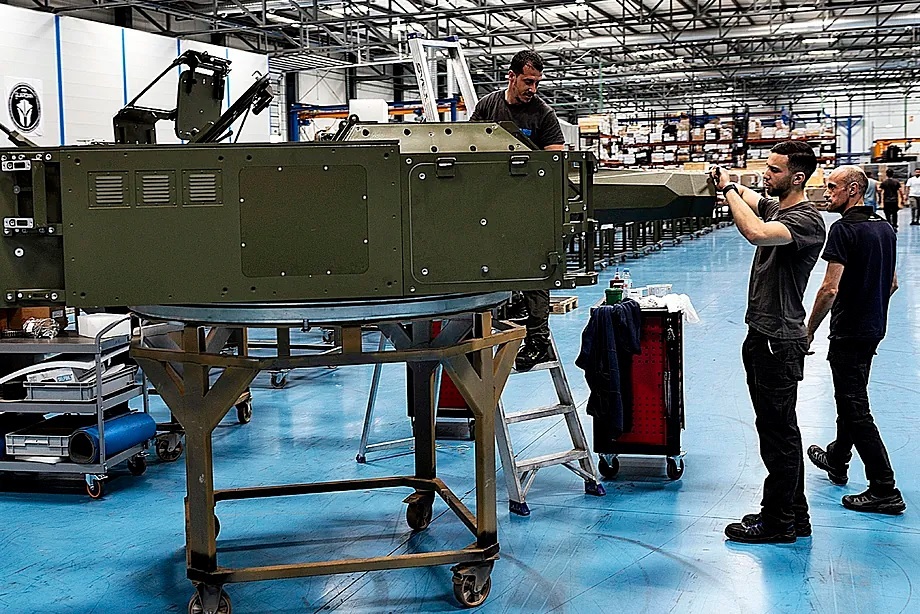The ESG 'trend' has been on the decline for years, and now the desire to be part of the huge wave of investment in the defense sector could end up sealing its fate. European asset managers, with trillions of euros in assets under management, have decided to readjust some of the limitations they imposed on their investment funds to access companies linked to the defense industry, although they still set some 'red lines' generally related to 'controversial' weapons such as cluster bombs, landmines, or biological, chemical, or nuclear weapons.
This is the case of UBS, the largest European asset manager by volume of assets under management, with over 6 trillion euros. In March of this year, it decided to update its exclusion policy for sustainability reasons to include companies on the list that also manufacture conventional weapons. But they are not alone. The list keeps growing. The German company Allianz, with over 2 trillion euros in assets (more than the entire Spanish economy combined), has also lifted restrictions for its ESG funds and believes that by September, the first companies in which it invests will be known. Their German compatriot, Deutsche Bank, fifth in terms of asset volume, also relaxed its requirements this spring. "Is it now the time to consider whether environmental, social, and governance (ESG) criteria should be relaxed to allow financing of defense companies?" is being reconsidered at the French asset manager Natixis, which believes the sector remains divided on this issue, after years of advocating for 'sustainable' investment.
To avoid 'greenwashing' and distinguish those who claimed to be 'green' without practicing it, the fund industry supported a regulation in 2019 (the SFDR) that categorized ESG funds into categories such as 'article 8' and 'article 9', which aimed to promote sustainable objectives with investment and, in the latter case, to actively participate in activities focused on it. But they also limited entry into companies linked to war, tobacco, those using palm oil in their processes, involved in deforestation, illegal activities, adult content production, or ethically questionable behavior.
But the war in Ukraine marked a turning point in this approach, and now the thesis, with so much public money behind it, is strengthened. Since the summer of 2023, a year after the invasion began, funds classified as Article 8 and Article 9 that have at least one company in this sector have increased from 23.6% to 33% as of February this year; and from 6.7% to 12%, double, among the 'strictest' funds.
A higher holding of defense companies in the portfolio could result in capital flows of between $5,000 and $27,000 million, equivalent to 1% to 4% of the current market capitalization, as estimated by Goldman Sachs analysts. "Historically, defense and aerospace companies have been the most underweighted in ESG investors' portfolios, second only to tobacco firms" and by a significant margin. According to data compiled by the investment bank, the weight these two sectors represented was up to 95% lower for defense companies and 64% for aerospace companies. But now, in some way, they have felt the 'call' from European authorities to participate in this upcoming process of reconstruction and accelerated rearmament.
BILLION-DOLLAR PUBLIC INVESTMENTS
Regulators have done their part. The UK Financial Conduct Authority (FCA) published a clarifying document last March confirming that no sustainability rule prohibits investment in defense companies. In December of last year, the German government released another report warning the industry that no ESG regulation should restrict or negatively impact funding in the sector.
All this in a very favorable context. The European rearmament plan includes raising 800 million euros in financing investment until 2030, with a significant portion going to private companies, and another 150 million euros in loans for joint public financing between states. Germany, on the other hand, approved another megaplan focused on infrastructure of 500 million euros at the end of March, which also includes strengthening its defense industry and energy transition, expandable up to 800 billion euros. This is in addition to the commitment of the main European economies to increase their defense spending. Spain will reach 2% of GDP this year, with an additional disbursement of 10,500 million euros; although the goal advocated by NATO and the US is 5% of the economy, a threefold increase from the current expenditure.
Euronext, the largest European stock exchange operator, decided in May to launch a series of indices taking advantage of the situation related to what it renamed as ESG: Energy, Security, and Geostrategy, following its initials. "Europe must defend its own values, interests, and way of life (...) And we all must act now. Investors are increasingly interested in increasing their exposure to the growing opportunities" related to these sectors, stated Stéphane Boujnah, CEO of Euronext. The passive management giant, BlackRock, launched a specific defense ETF in Europe two weeks ago to channel all the money behind it.
So far this year, the European defense and aerospace sector has surged by 43%, five times more than the Stoxx 600 appreciation. In Spain, the issue is that there are no listed companies to invest in with significant size, beyond Indra, whose stock is at all-time highs after rising by 104% just since January 1.
